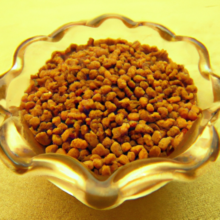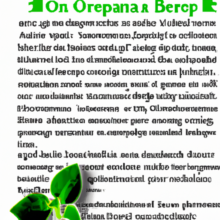Understanding the Risks of Medicinal Herb Use
Have you ever wondered if there are any risks or side effects associated with using herbs medicinally? It’s a common question that many people have, especially those who are interested in alternative forms of medicine. While herbs can certainly have numerous health benefits, it’s important to understand that they also come with their own set of potential risks. In this article, we will delve into the topic of medicinal herb use and discuss the potential risks and side effects that you should be aware of. So, whether you’re a fan of natural remedies or just curious about the topic, keep reading to learn more about the risks associated with using herbs medicinally.
When it comes to using herbs medicinally, it’s crucial to be informed about any possible risks or side effects. While herbs have been used for centuries for their healing properties, it’s important to remember that they are not without their potential drawbacks. Some herbs can interact with certain medications, causing adverse effects or reducing the effectiveness of the medication. Additionally, incorrect dosage or prolonged use of certain herbs can lead to toxic reactions or even organ damage. These risks highlight the importance of consulting with a healthcare professional or an experienced herbalist before incorporating herbs into your medicinal routine. In the upcoming article, we will dive deeper into these risks and explore how you can safely and effectively use medicinal herbs to enhance your well-being.

Understanding the Risks of Medicinal Herb Use
Are there any risks or side effects associated with using herbs medicinally? Many people turn to medicinal herbs as a natural alternative to conventional medicine, believing that they are safe and free from side effects. While herbs can provide various health benefits, it is essential to be aware of the potential risks and side effects that may arise from their use. In this article, we will explore the potential risks of using medicinal herbs and why it is essential to exercise caution when incorporating them into your health regimen.
Potential Side Effects of Medicinal Herb Use
Just like any medication, medicinal herbs can have side effects. Some individuals may experience adverse reactions such as stomach upset, diarrhea, dizziness, headaches, or allergic reactions when using certain herbs. It is crucial to educate yourself about the potential side effects of the herbs you are considering and to monitor your body’s response when introducing new herbs into your routine. If you experience any unexpected or severe side effects, it is best to discontinue use and consult with a healthcare professional.
Risk of Allergic Reactions
Allergic reactions can occur when using medicinal herbs, particularly if you have known allergies to certain plants or botanical families. It is important to research and identify the specific plants or families of plants that may trigger an allergic reaction. Common allergenic plant families include the Asteraceae family, which includes herbs like chamomile and echinacea. If you have a history of allergies, it is advisable to consult with a healthcare professional before using any herbs to minimize the risk of an allergic reaction.
Interaction with Medications
One significant concern when using medicinal herbs is the potential interaction with prescription or over-the-counter medications. Herbs may contain active compounds that can interfere with medications and either enhance or reduce their effects. This can lead to unintended consequences, such as decreased effectiveness of the medication or increased risk of side effects. If you are taking any medications, it is crucial to consult with a healthcare professional before incorporating medicinal herbs into your routine to ensure safe and effective co-administration.
Contamination and Quality Issues
Another risk associated with medicinal herb use is the potential for contamination or poor quality products. Herbs sourced from unreliable suppliers or those that have not undergone rigorous quality testing may be contaminated with heavy metals, pesticides, or other harmful substances. Additionally, there is a risk of mislabeling where a product may not contain the advertised herb or may be adulterated with other substances. To mitigate these risks, it is advisable to purchase herbs from reputable suppliers that follow good manufacturing practices and conduct quality testing.
Long-term Health Implications
While many herbs offer short-term health benefits, their long-term effects are not always well-documented. Some herbs may have cumulative effects or potential long-term interactions that have yet to be fully understood. It is crucial to be mindful of the potential long-term implications of using certain herbs and discuss any concerns with a healthcare professional. Regular monitoring of your health and open communication with your healthcare provider can help identify any potential issues as early as possible.
Misidentification of Herbs
One risk that often goes unnoticed is the misidentification of herbs. There are many look-alike plants in nature that may be mistaken for a medicinal herb. Using the wrong plant can lead to ineffective treatment or even toxic reactions. If you are harvesting herbs yourself, it is essential to be equipped with accurate identification methods or rely on a qualified herbalist or botanist. Alternatively, purchasing herbs from reputable suppliers can help ensure that you are getting the correct herb and avoiding potential misidentifications.
Pregnancy and Breastfeeding Risks
Pregnant women and breastfeeding mothers need to exercise caution when using medicinal herbs. Some herbs may have adverse effects on fetal development or be passed on to the baby through breast milk. Certain herbs may stimulate contractions, leading to complications during pregnancy. It is crucial for pregnant women and nursing mothers to consult with a healthcare professional before using any herbs to ensure the safety of both mother and child.
Risk of Overdose or Toxicity
While herbs are natural substances, it is important to remember that they can still be potent and have the potential for overdose or toxicity. Some herbs may have a narrow therapeutic index, meaning that the difference between an effective dose and a toxic dose is small. Taking excessive amounts of certain herbs may lead to adverse effects, ranging from mild discomfort to severe toxicity. It is essential to adhere to recommended dosage guidelines and seek professional advice if you are unsure about the appropriate dosage for a particular herb.
Adverse Reactions in Children
Children are particularly vulnerable to the risks associated with medicinal herb use. Their smaller bodies may react differently to herbs compared to adults, and certain herbs may present a higher risk of adverse reactions in children. It is crucial to consult with a pediatrician before using any herbs on children or incorporating them into their healthcare routine. Proper dosing and careful monitoring are essential in ensuring the safety and well-being of children when using medicinal herbs.
Conclusion
While medicinal herbs can offer numerous health benefits, it is important to understand and respect the potential risks and side effects associated with their use. From potential allergic reactions and interactions with medications to contamination issues and misidentifications, it is vital to approach the use of medicinal herbs with caution. Consulting with a healthcare professional is strongly advised, especially if you are pregnant, breastfeeding, taking medications, or administering herbs to children. By staying informed and practicing responsible herbal medicine, you can enjoy the benefits of medicinal herbs while minimizing the potential risks.





